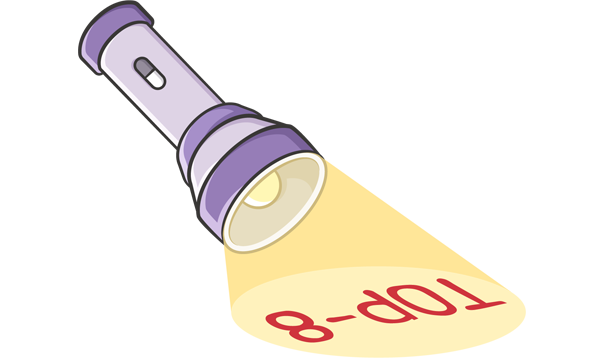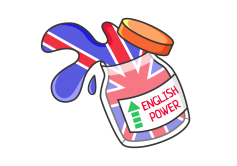1. Word Wall
To help your students get more engaged in vocabulary development, you need to nurture word consciousness. This means raising students’ awareness of, and interest in all sorts of words and their meanings.
A Word Wall can help you achieve this. This is a collection of words that are displayed in large visible letters on a wall, bulletin board, or other display surfaces in a classroom.
Source: ELL STRATEGIES & MISCONCEPTIONS
So, set this wall and encourage your students ‘to walk the wall’ and hang their favourite words, new or unknown, on it.
Then, invite their classmates to add sticky notes with pictures or graphics, synonyms, antonyms, or related words. Then, student partners walk along the wall to quiz each other on the words (Graves & Watts-Taffe,2008).
Use the Word Wall one or more times a week. You’ll help your students make connections between new and known words.
Since this is an ongoing activity during the whole year, you can keep observational notes of those students who are posting, responding to their words and those who are not adding words to the wall.
This will help you better understand what your students need to expand their vocabulary.
2. Word Box
Word Box is one of the strategies for teaching vocabulary. This is a weekly strategy that can help students retain and use words more effectively.
Students select words to submit to the word box on Friday. These are words they find interesting or ones they want to understand better. They either use the word in their own sentence or take the same sentence where this word was found.
Then, select five words to teach the following week.
Monday: Introduce the five words in context, explain them, then tack them to the Word Wall.
Tuesday: Ask students to create a non-linguistic representation of the words.
Wednesday: Discuss the meaning of the words allowing think-pair-shares.
Thursday: Ask students to write sentences using those words.
Friday: This is the day to assess students’ learning of the five words using this activity.
Ask one student to answer fill-ins for five words. Give students three cards that can hold up: green cards show they agree with the student’s answer, yellow they are unsure and red ones they disagree.
For assessing, use a checklist with the vocabulary running horizontally across the top margin and the class list running vertically down the side. (Adapted from Grant et al., 2015, p.195)
3. Vocabulary Notebooks
Ask your students to maintain vocabulary notebooks throughout the year where they write the meaning of the new words.
You can introduce a new word each week and work together with students to explore its meaning. Then, ask them to sketch a picture to illustrate the word and present their drawings to the class at the end of the week.
Another way to use vocabulary notebooks :
Students create a chart. The first column indicates the word, where it was found, and the sample sentence in which it appeared.
The other columns depend on your students’ needs.
You can include a column for meaning ( where students define the word or add a synonym), for word parts and related word forms (where they identify the parts and list any other words related to it), a picture, other occurrences (if they have seen or heard this word before, they describe where) and for practice or how they used this word. (Lubliner, 2005)
4. Semantic Mapping
These are maps or webs of words that can help visually display the meaning-based connections between a word or phrase and a set of related words or concepts.
Teach your students how to use semantic mapping. Pick a word you intend to explain, draw a map or web on the board ( or on Zoom whiteboard or any digital tool in case you’re teaching online) and put this word in the centre of the map. Then, ask students to add related words or phrases similar in meaning to the new word. (see the example below)
Source:weebly.com
5. Word Cards
Word cards can help students review frequently learned words and so improve retention.
On one side of the card, students write the target word and its part of speech (whether it’s a verb, noun, adjective, etc.).
On the top half of the other side, they write the word’s definition (in English and/ or a translation). They also write an example and a description of its pronunciation. The bottom half of the card can be used for additional notes once they start using the word.
Ask students to add more information about the word each time they practise or observe it (sentences, collocations, etc.).
Yet, advise them not to add too much information in order to facilitate more reviewing the cards.
Devote regularly class time for students to bring their word cards to class. Involve them in activities such as describing the new words, quizzing one another, categorizing them according to subject or part of speech.
Also, show your students how to store and organize those cards. This is, for instance, by putting them into a box with the categories they select or ordering them in terms of difficulty. (Schmitt & Schmitt, 2005)
6. Word Learning Strategies
Our students often have only partial knowledge of the words they learn in the classroom. This is so since a word can have different meanings which they may not be familiar with.
Therefore, teaching students word learning strategies is important to help them become independent word learners. This is by teaching, modelling and providing a variety of strategies that serve different purposes.
Here are some examples of word-learning strategies.
a) Using word parts
Breaking words into meaningful parts facilitates decoding. So, studying words’ parts can help students guess the meaning of new words from context.
There are three basic ways that word parts are combined in English: prefixing, suffixing, and compounding.
Teach those parts. But, focus on the most occurrent ones.
Providing explanations about their use and meanings with illustration is necessary. Yet, it is still not enough.
You need to provide opportunities for students to experiment with word-building skills.
For instance, you can hand out a list of productive prefixes and have students compile a list of words using them. Then, ask them to compare the function of the prefixes in the various examples.
However, consider your students’ level since word parts are more useful to students with larger vocabularies. For instance, a student who doesn’t know the meaning of the adjective content cannot guess the word discontent.
Remember also that learning word parts is an ongoing process. So, encourage your students to continue experimenting with them. (Zimmerman, 2009a)
b) Asking questions about word
Knowing a word means knowing about its many aspects: its meaning(s), collocations, grammatical function, derivations, and register.
So, you can encourage your students to explore a new word’s meaning(s) by asking them to address detailed questions about those features and answer them.
Students will ask questions like these :
• Are there certain words that often occur before or after the word ? (collocation)
• Are there any grammatical patterns that occur with the word ? (grammar).
• Are there any familiar roots or affixes for this word ? (word parts)
• Is the word used by both men and women? (register/appropriateness)
• Is the word used in both speaking and writing?
(register/appropriateness)
• Could it be used to refer to people? Animals?Things? (meaning)
• Does it have any positive or negative connotations? (meaning) (Zimmerman,2009a)
c) Reflecting
When students learn new words it does not necessarily mean they’ll use them. Students may avoid using words in writing because they are unsure of the spelling. When they speak, they may not be willing to use certain words as they roughly understand them in context.
Encouraging students to self-assess their knowledge of each new word they learn can help them focus on areas needing practices. Here is an example of a self-assessment scale students can use.
Besides these 6 engaging strategies for teaching vocabulary, here are some essential tips to follow while using them :
1) Identify the potential list of words to be taught. Keep the number of words to a minimum (three to five words in one lesson) to ensure there is ample time for in-depth vocabulary instruction, yet enough time for students to practise them.
2) Expose students to multiple contexts in which the new words can be used. This will support them to develop a deeper understanding of these words and how they’re used flexibly.
You can do so by giving students frequent opportunities to hear the meaning of the words, read content where these words are included, and also use them in speaking and writing.
3) Encourage extensive reading because this gives students repeated or multiple exposures to words and is also one of the means by which students see vocabulary in rich contexts.
So, for rich vocabulary development, use a variety of strategies for teaching vocabulary and provide the necessary support and guided practice. Besides, assess vocabulary learning and encourage students to learn more words outside the classroom.
What other Strategies For Teaching Vocabulary would you suggest? I would love to hear from you.
References
Grant, K..B., Golden, S.E., & Wilson, N.S.(2015). Literacy Assessment and Instructional Strategies: Connecting to the Common Core. USA: Sage Publications, Inc.
Graves, M.F., & Watts-Taffe, S.M. (2002). The place of word consciousness in a research-based vocabulary program. In A.E. Farstrup 1 S.J.Samuels (Eds.), what research has to say about reading instruction (3rd ed., pp.140-165). Newark, DE: International Reading Association.
Graves, M.F., & Watts-Taffe, S.M. (2008). For the love of words: Fostering word consciousness in young readers. The Reading Teacher, 62 (3), 185-193.
Hulstijn, J. & Laufer, B.(2001). Some empirical evidence for the involvement load hypothesis in vocabulary acquisition. Language Learning 51/3:539-58.
Lubliner, SH.(2005). Getting into Words: Vocabulary Instruction That Strengthens Comprehension. Baltimore: Paul H. Brooks Publishing.
Schmitt, D., & Schmitt, N.(2005). Focus on Vocabulary. New York: Longman.
Zimmerman, Cheryl. B.(2009a). Word Knowledge: A vocabulary teacher’s handbook. New York: Oxford University Press.
Zimmerman, Cheryl. B.(2009b).(ed.). Inside Reading: The Academic Word List in Context. Four Levels. New York: Oxford University Press.
Широкий словарный запас — то, к чему должен стремиться каждый изучающий английский, ведь чем больше слов вы знаете, тем больше можете сказать. Однако, помимо изучения новых слов, нужно учиться еще и правильно сочетать их между собой, составлять из них предложения и использовать в своей речи. И всем этим премудростям вас научат учебники по лексике английского языка. Мы расскажем о 8 самых популярных пособиях для пополнения словарного запаса и объясним, как работать с ними.
Мы уже составляли для наших читателей подробный обзор 4 лучших учебников по английскому языку. При этом мы писали, что указанные комплексные пособия помогают развивать все навыки владения английским языком, а также расширяют ваш словарный запас. Ниже мы расскажем, почему к универсальному учебнику стоит добавить еще и книгу для увеличения лексического запаса. В этом обзоре мы представим вам 8 пособий по лексике.
Зачем нужны дополнительные учебники по лексике английского языка
1. Эффективно учить слова
Каждый из представленных учебников по лексике английского языка ориентирован на изучение новых слов в контексте. Вы учите новую лексику и сразу же используете ее в практических упражнениях, видите, как она «работает» в естественной речи. Это самый продуктивный и быстрый способ пополнения словарного запаса.
2. Точно выражать свои мысли
Знание грамматики и хороший словарный запас — то, без чего невозможно уверенно говорить по-английски. Кроме того, если вы собираетесь сдавать экзамен или эмигрировать, большой словарный запас значительно облегчит вам жизнь. Конечно, основной учебник дает хороший запас лексики для каждого уровня знаний, но, если вы хотите сделать свою речь более естественной и выразительной, вам пригодятся пособия для пополнения словарного запаса.
3. Лучше воспринимать речь на слух
Очевидно, что чем больше английских слов вы знаете, тем больше можете понять. Поэтому мы советуем обратить внимание на такие пособия тем, кто жалуется, что с трудом воспринимает английскую речь на слух. Довольно часто причина такого непонимания состоит в том, что у человека ограниченный словарный запас, поэтому наш мозг играет с нами злую шутку — все незнакомые слова мы попросту не слышим.
4. Активировать словарный запас
Огромный плюс таких пособий в том, что они делают упор не столько на обучении новым словам, сколько на практику использования различных слов английского языка. Наверняка вы слышали, как люди жалуются: «Я уже читаю англоязычные тексты, а говорю очень плохо». Все дело в том, что такие студенты имеют обширный пассивный словарный запас английского языка — узнают слово, когда слышат его или встречают в тексте. В то же время их активный запас очень мал — они не могут использовать в своей речи слова, которые, казалось бы, знают. Пособия по изучению английской лексики помогают решить эту проблему: благодаря практическим упражнениям и постоянным повторениям слова переходят из пассивного в активный словарный запас.
5. Быстрее достичь следующего уровня знаний английского
Бывает, что именно бедный словарный запас «тормозит» человека, не дает ему перейти на следующий уровень. В таком случае работа с дополнительными пособиями поможет ускорить процесс обучения.
На каком уровне нужно брать такое пособие для обучения? Каждая из серий книг включает в себя учебники для разных уровней знаний, поэтому на любой ступени вы сможете подобрать себе хороший материал для пополнения словарного запаса. Если вы учите английский язык с преподавателем, можете попросить его брать дополнительный материал из понравившегося вам учебника. Если вы занимаетесь английским самостоятельно, старайтесь регулярно выполнять задания из выбранного пособия.
Обзор лучших учебников для изучения английской лексики
1. English Vocabulary in Use
| Elementary | Pre-Intermediate – Intermediate |
Upper-Intermediate | Advanced |
|---|---|---|---|
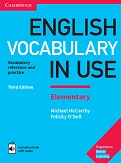 |
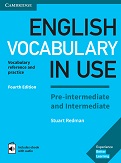 |
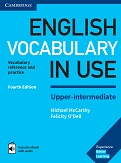 |
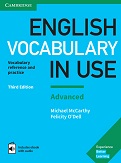 |
Издательство: Cambridge University Press.
Авторы: Michael McCarthy, Felicity O’Dell.
Структура учебника и принцип работы с ним
Формат этого учебника схож с изданиями English Grammar in Use by Raymond Murphy, о котором мы писали в обзоре «4 лучших учебника по грамматике английского языка». Каждый урок-юнит занимает 1 разворот: слева дана теория, справа — практические упражнения.
Работать с этим учебником можно двумя способами. Если ваш словарный запас довольно скудный, лучше всего идти от первого урока к последнему и ничего не пропускать. Если же вам не хватает знаний по каким-то определенным темам, можно выбрать и проштудировать именно их.
Упражнения на пополнение словарного запаса в English Vocabulary in Use представляют собой задания на выбор слова, заполнение пропущенных слов в тексте, кроссворды, написание небольших текстов, подбор слова к картинке, деление слов на группы по каким-либо признакам, подбор определений к идиомам и фразовым глаголам, подбор синонимов и т. п.
Особенности учебника
Если вы учите английский язык самостоятельно, то это пособие будет удобно использовать. В конце учебника приведены ответы ко всем упражнениям, вы сможете сами проверить себя.
Несомненное достоинство пособия — наличие в конце книги списка всех слов, встречающихся в юнитах. Слова написаны в алфавитном порядке, к каждому из них дана транскрипция. Кроме того, возле каждого слова указан номер страницы, на которой оно встречается, так что, если вы хотите узнать, как его правильно использовать, просто откройте нужную страницу.
2. Work on Your Vocabulary
| Elementary | Pre-Intermediate | Intermediate | Upper-Intermediate | Advanced |
|---|---|---|---|---|
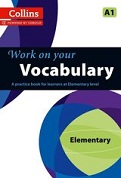 |
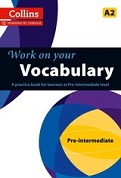 |
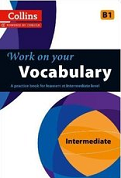 |
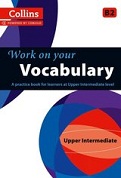 |
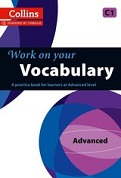 |
Издательство: Collins
Структура учебника и принцип работы с ним
Формат серии учебников Work on Your Vocabulary схож с серией English Vocabulary in Use. Отличие в том, что один урок занимает два разворота. Теоретический материал представлен на первых двух страницах, а практические задания расположены на двух других.
Мы советуем проходить учебник последовательно — шаг за шагом разбирать каждый из уроков. Однако в оглавлении издания дан список тем, поэтому вы можете выбрать, какую лексику учить в первую очередь. Кроме того, в конце учебника в алфавитном порядке приведен список всех слов, использованных в каждом уроке.
Выполняя задания, вам нужно вставить пропущенное слово, подчеркнуть верное значение, выбрать подходящий вариант или правильно подписать иллюстрацию.
Особенности учебника
В каждом учебнике из серии Work on Your Vocabulary даны ответы ко всем упражнениям, а значит, вы можете заниматься по нему самостоятельно. Наш совет ― проверять произношение слов в электронных словарях, чтобы не допускать ошибок в речи.
3. Oxford Word Skills
| Basic | Intermediate | Advanced |
|---|---|---|
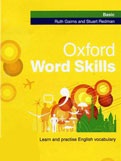 |
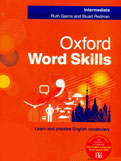 |
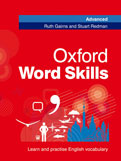 |
Издательство: Oxford University Press.
Авторы: Ruth Gairns, Stuart Redman.
Структура учебника и принцип работы с ним
В этой серии британских учебников по пополнению словарного запаса подходящий материал следует подбирать по следующему принципу:
- Пособие Basic — для уровней Elementary и Pre-Intermediate.
- Пособие Intermediate — для уровней Intermediate и Upper-Intermediate.
- Пособие Advanced — для уровней Advanced и Proficiency.
Каждая книга этой серии содержит 80 юнитов. Урок занимает от одной до трех страниц в зависимости от темы. К блокам теоретического материала сразу прилагаются и практические упражнения для закрепления знаний. Все юниты разбиты по темам на группы-модули из 5 или 10 уроков. После каждого модуля в учебнике вам предложат пройти тест, который проверит, насколько хорошо вы усвоили материал всех пройденных уроков.
При работе с этим учебником вы также можете идти по порядку или выбирать именно те темы, в которых у вас есть пробелы. Однако, если вы изучаете английский язык самостоятельно, первый вариант предпочтительнее: так вы не пропустите ничего важного.
Задания для пополнения словарного запаса многообразны: вставить пропущенные буквы, подобрать синонимы, ответить на вопросы, выбрать слово, вставить пропущенное слово в фразу и т. п. Помимо письменных упражнений для тренировки словарного запаса в Oxford Word Skills есть задания для развития говорения и аудирования.
Особенности учебника
В конце пособия есть ответы ко всем упражнениям, а также тестам, следующим после каждого модуля, так что этот учебник тоже можно порекомендовать для самообучения. В конце пособия есть список слов в алфавитном порядке. К каждому из них дана транскрипция и указан номер страницы, на которой вы найдете упражнения с этим словом.
Дополнительные онлайн-упражнения к этой серии учебников вы найдете на сайте elt.oup.com. Перейдите по ссылке в раздел Basic, Intermediate или Advanced, и вам будут доступны упражнения к соответствующему пособию.
Записывайтесь на курс разговорной практики и тренируйте лексику в диалоге с преподавателем.
4. Test Your Vocabulary
| Elementary | Pre-Intermediate | Intermediate | Upper-Intermediate | Advanced |
|---|---|---|---|---|
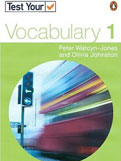 |
 |
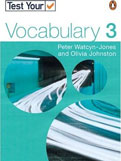 |
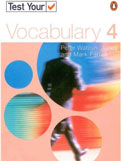 |
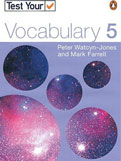 |
Издательство: Pearson.
Авторы: Peter Watcyn-Jones, Olivia Johnston, Mark Farrell.
Структура учебника и принцип работы с ним
Каждая из пяти книг серии Test Your Vocabulary состоит из 60 юнитов, которые занимают 1-2 страницы в зависимости от темы. Эти пособия по изучению английской лексики понравятся тем, кто любит выполнять различные тесты. Однако в книгах есть и теоретический материал, он изложен кратко, в виде небольшой исторической или грамматической справки.
Несмотря на то что эта серия представляет собой книги с тестами на словарный запас, задания представлены самые разнообразные. Вы можете решать разные виды кроссвордов, подписывать картинки, объединять слова в словосочетания, подбирать фразы для героев комикса и т. п.
Авторы предлагают работать с учебником следующим образом. Чтобы хорошо запомнить новые слова, к ним нужно неоднократно возвращаться, поэтому все заметки в книге делайте карандашом. После выполнения упражнения и самопроверки уберите все ответы. Через 1-2 месяца вернитесь к уроку и попробуйте пройти его еще раз. Так вы закрепите лексику в памяти.
Особенности учебника
Главное достоинство этой серии — интересные практические тесты, которые помогают быстро запомнить новые слова и специфику их употребления. В конце каждого учебника вы найдете ответы к тестам и список слов для изучения в алфавитном порядке.
5. Key Words for Fluency
| Pre-Intermediate | Intermediate | Upper-Intermediate |
|---|---|---|
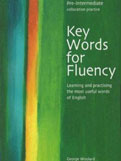 |
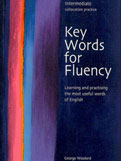 |
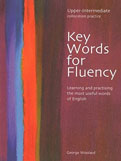 |
Издательство: Heinle.
Автор: George Woolard.
Структура учебника и принцип работы с ним
Учебники уровней Pre-Intermediate и Intermediate этой серии содержат по 22 объемных урока, которые делятся на несколько частей. Каждая часть посвящена 1 слову. К этому слову вам предложат около 10-20 вариантов словосочетаний (collocations), то есть вы увидите, с какими словами и как именно рассматриваемая лексика может «работать». В пособии уровня Upper-Intermediate слова не объединяются по темам, но принцип изложения материала заложен тот же.
Все эти полезные словосочетания вы сможете изучить и запомнить в ходе выполнения практических упражнений. Они довольно однотипные, зато после их выполнения вы усвоите, в каких случаях какое выражение следует употреблять. Кроме того, многие фразы содержат в себе предлоги, а изучающие английский подтвердят, что не всегда легко запомнить, какой предлог нужно использовать в том или ином случае. Выучив выражение полностью, вы хорошо запомните и предлог, который употребляется в конкретном словосочетании.
Особенности учебника
Эта серия учебников отличается от остальных пособий тем, что вы учите не новые слова, а целые выражения. Чтобы заговорить уверенно, необходимо знать, как слова «сотрудничают» друг с другом, то есть в связке с какими словами они употребляются. Знание таких выражений позволит вам быстрее заговорить на английском языке, избегая ошибок в использовании слов.
Этот учебник мы рекомендуем использовать тем, кто готовится к экзамену FCE, ведь при написании эссе или сдаче разговорной части вам будет легче оперировать выражениями, а не отдельными словами.
В пособии уровня Pre-Intermediate предусмотрены тесты после изучения каждой группы уроков, в двух других учебниках таких заданий на проверку нет, но вы можете через некоторое время вернуться к уроку и попробовать пройти его заново, так вы увидите, что отложилось в памяти.
В конце учебников есть ответы ко всем заданиям, а также список слов в алфавитном порядке с указанием страниц, на которых они встречаются.
6. 4000 Essential English Words
| Basic | Elementary | Pre-Intermediate |
|---|---|---|
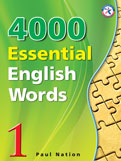 |
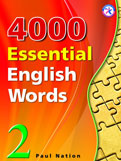 |
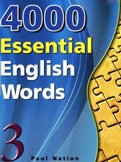 |
| Intermediate | Upper-Intermediate | Advanced |
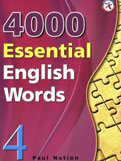 |
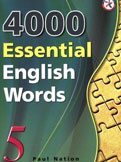 |
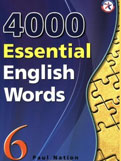 |
Издательство: Compass Publishing.
Автор: Paul Nation.
Структура учебника и принцип работы с ним
Пособия серии 4000 Essential English Words состоят из 30 юнитов, каждый из которых посвящен изучению 20 новых слов и правилам их использования. Таким образом, по окончании изучения всех 6 учебников вы будете знать 3 600 слов из уроков + около 400 слов из приложений, находящихся в конце учебника.
Как утверждает автор пособия, слова для изучения подбирались по следующим критериям:
- Универсальные слова. К изучению предлагаются слова, которые используются как в формальном, так и в неформальном общении. Неважно, какой именно английский вы учите — общий разговорный, технический или деловой английский — эти слова обязательно пригодятся вам.
- Часто употребляемые слова. Эта лексика широко используется носителями языка в устной и письменной речи в разных сферах деятельности. Вы будете часто встречать эти слова в статьях, книгах, новостях и обычном разговоре.
- По утверждению авторов, предложенные к изучению слова покрывают примерно 90% лексики, используемой в разговорной речи и современной художественной литературе, и 80% лексики, используемой в научных статьях и газетах.
В уроке представлено 20 новых слов, к каждому из них дано определение на английском языке, транскрипция, указана часть речи, приведен пример предложения и нарисована картинка. После этого вам предложат сделать несколько упражнений, а затем прочитать текст, в котором встречаются все новые слова, и ответить на вопросы к нему.
Особенности учебника
Если вы любите читать на английском, советуем выбрать именно эту серию учебников по лексике английского языка. Наличие текстов с изучаемыми словами позволит вам запоминать слова не только по упражнениям, как в других книгах, но и в контексте. Увлекательные статьи легко читаются, следовательно, и слова из них будет несложно запомнить.
В конце учебников есть приложения, в которых также указаны полезные для изучения слова в виде визуального словаря. После приложений представлен список слов в алфавитном порядке с указанием страниц, на которых они упоминаются в книге.
Ответов к упражнениям в пособии нет, поэтому советуем либо учить английский с преподавателем, либо приобрести дополнительную книгу с ответами.
7. Vocabulary in Practice
| Basic | Elementary | Pre-Intermediate |
|---|---|---|
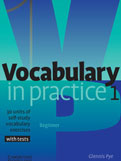 |
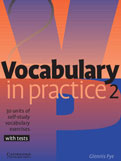 |
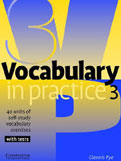 |
| Intermediate | Upper-Intermediate | Advanced |
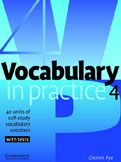 |
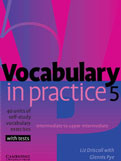 |
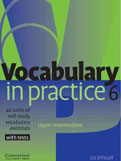 |
Издательство: Cambridge University Press.
Автор: Glennis Pye.
Структура учебника и принцип работы с ним
Содержание уроков полностью отвечает названию учебника — Vocabulary in Practice, то есть здесь представлены только практические упражнения для расширения словарного запаса, теоретических сведений нет.
Каждое из пособий этой серии состоит из 30-40 юнитов (в зависимости от уровня). После 10 уроков вам предложат повторить материал и заодно проверить себя при помощи теста.
Авторы учебника предлагают идти от первого урока к последнему — вариант, который позволит максимально хорошо изучить все темы. Также вы можете пропускать уроки по темам, по которым имеете хороший словарный запас, а на изучение брать только плохо знакомые вам темы. После окончания обучения пройдите проверочные тесты и при необходимости повторите непонятые темы.
Практические упражнения разнообразные: вам нужно будет подбирать синонимы, вставлять пропущенные слова, разгадывать кроссворды, подписывать предметы на картинках, составлять диалоги из готовых фраз и т. п.
Особенности учебника
Особенность этого издания — упор на грамматику. Следует отметить, что пособие построено таким образом, что даже без теоретических пояснений вам будет все понятно. В конце учебника есть ответы ко всем упражнениям и тестам. Там же вы найдете списки слов с транскрипцией.
8. Boost Your Vocabulary
| Basic – Elementary |
Elementary – Pre-Intermediate |
Pre-Intermediate – Intermediate |
Intermediate – Upper-Intermediate |
|---|---|---|---|
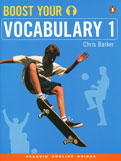 |
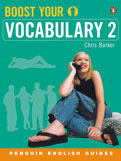 |
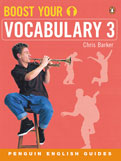 |
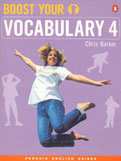 |
Издательство: Pearson Longman.
Автор: Chris Barker.
Структура учебника и принцип работы с ним
Пособия включают в себя 12 уроков-юнитов, занимающих по 6 страниц. После каждых четырех юнитов вам предложат пройти проверочный тест. Автор предлагает следующую схему работы с ним:
- Идите по порядку или выберите интересующую вас тему.
- Первые две страницы каждого урока содержат списки слов или выражений, это и будет ваш словарь-справочник. Рядом с английскими словами вам нужно написать перевод. Если вы занимаетесь самостоятельно, прослушайте правильное произношение в онлайн-словаре.
- Сделайте практические упражнения, не подглядывая в словарь.
- Проверьте упражнения, сверяясь с составленным вами словарем.
- Окончательно проверьте свои ответы, сверяясь с ключами в конце учебника.
- По прохождении четырех юнитов пройдите тестирование и при необходимости вернитесь к непонятой теме.
Теоретического справочника в учебнике нет, зато это отличный источник практических упражнений. Здесь есть задания в виде тестов, кроссвордов, ответов на вопросы и т. п.
Особенности учебника
В конце учебника даны ответы на задания для самопроверки. Там же вы найдете и краткие лексические комментарии к каждому уроку. В юнитах вы увидите пометки со значком REF, это значит, что за пояснениями следует обратиться к справочнику в конце учебника.
Мы рассказали о восьми учебниках по лексике английского языка, проверенных временем и нашими методистами. Все из них вы можете использовать как для самообучения, так и на уроках с преподавателем. Изучение новых слов по таким пособиям позволит вам не просто выучить незнакомую лексику, но и научиться ее правильно использовать в своей речи.
Хотите, чтобы опытный наставник помог вам расширить словарный запас и заговорить на английском языке бегло и грамотно? Выберите преподавателя по душе и начните заниматься уже сегодня.
© 2023 englex.ru, копирование материалов возможно только при указании прямой активной ссылки на первоисточник.
Сейчас так много книг по английской лексике, что я порой начинаю ностальгировать по тому времени, когда была только English Vocabulary in Use. Сидели мы тихо и учили 🙂 Радует то, что есть очень и очень неплохие альтернативы, главное —разобраться с ними.
English Vocabulary In Use
Начну с этой хрестоматийной серии по общей, непрофессиональной лексике. Существует очень много книг In Use от Cambridge. У меня есть только самые первые издания. Потом я уже бросила покупать издания новые, просто не успевала. Структура у всех одинаковая: на одной страничке слова по темам в различных ситуациях, на другой страничке упражнения. Хороши все эти книги тем, что собраны здесь слова самые разнообразные. Можно найти и устойчивые словосочетания, и фразовые глаголы, и идиомы, и даже рекомендации по работе со словами. Естественно, есть небольшие недочеты. Количество слов по теме минимум 20, их не получается закрепить с помощью четырех-пяти упражнений на страничке с практикой, приходится много своего придумывать. Или совсем упражнения не делать и выбирать для практики слов 10-15. Бывает, что две темы объединяются, например, Cinema and Theatre, и приходится делать упражнения по теме, которая не нужна.

Oxford Word Skills
С количеством слов для практики угадали авторы ‘Oxford Word Skills’ (Basic, Intermediate, Advanced). Признаюсь честно, это мои любимые книги по неспециализированной лексике. Слов на страничке немного, даются в виде историй от первого лица, заголовков, объявлений и т. п. В глоссарии объясняется, что они означают, приводятся синонимы или антонимы, производные от этих слов. Упражнения там, конечно, несерьезные, скорее для проформы, но на это можно закрыть глаза из-за живых контекстов.

Key Words for Fluency
‘Key Words for Fluency ‘от Cengage сделаны для уровней pre-intermediate, intermediate, upper-intermediate. В первых двух книгах ключевые слова разделены на секции, а в каждой секции — слова на тему, все они идут в маленькое оглавление перед каждой частью. Например, для темы Your House автор выбрал house, stairs, room, floor carpet, wall, ceiling, door, light, light, window, heating. Затем на каждой страничке мы делаем упражнения и практикуем словосочетания с этими ключевыми словами.
Key Words for Fluency (pre-intermediate)
В целом все эти слова обозначают конкретные предметы, абстрактные слова появляются к концу уровня intermediate. Для upper-intermediate придумана уже другая структура, и дается только абстрактная лексика в алфавитном порядке.

Эти книги показались мне очень полезными, когда нужно потренировать какое-то существительное в контексте, и нет необходимости пользоваться словарем словосочетаний, они сами по себе как мини-словарики. Только вот ключевые глаголы и прилагательные по темам совсем не даются, а это как-то однобоко. А мне бы хотелось сказать своим студентам, что может быть powerful и что можно endorse.
English Collocations in Use
С этим помогут справиться ‘English Collocations in Use’ (intermediate, advanced). Структура похожа на ‘English Vocabulary in Use’ — одна страничка теории и одна страничка практики. Темы самые разнообразные, понятие «словосочетание» трактуется очень широко, так что можно здесь встретить и фразовые глаголы, и идиомы.

Конечно, не стоит брать нахрапом все эти книги, даже одного уровня, можно просто выработать определенный порядок работы с ними. Самое главное — это определиться, какие нужны темы и какое сочетание конкретных и абстрактных слов хочется иметь в своем словарном запасе по мере продвижения.
Фото — мои.
Библиографическое описание:
Рузметова, Д. А. Teaching vocabulary — the basis for forming four main skills / Д. А. Рузметова. — Текст : непосредственный // Молодой ученый. — 2016. — № 15.3 (119.3). — С. 15-17. — URL: https://moluch.ru/archive/119/32987/ (дата обращения: 15.04.2023).
The degree of the President Republic of Uzbekistan PD-1875 as of 10 December 2012, “On Measures on Further Improvement of teaching of Foreign Languages”, was the essence of the country`s reforms in the field of foreign language learning. Since the adoption of the system-generating decree all the work in this area has been intensified and major reforms in modernization of teaching foreign languages at all levels continuous education have started.
Nowadays in communicative — cognitive approach vocabulary competence is very important for communication in a FL; it is impossible to read, write, speak or listen without knowledge of vocabulary. Practice and theory of FL shows that the importance of teaching/learning vocabulary can hardly be overvalued. As many teachers of FL reading comprehension will attest, when their students are faced with an unfamiliar text in the foreign language, the first challenge seems to be its vocabulary. When the text has many new words, students are in despair and seem to be discouraged. When the vocabulary of the text is more familiar, students are more likely to continue with the reading task. There are many methods teachers use to teach vocabulary or to encourage vocabulary self-learning by their students. Rogova G.B (1992) and Jalolov J. J (1996) distinguish between incidental and intentional vocabulary learning. They claim that both approaches are present in FL learning, since students learn vocabulary intentionally as part of course requirements but also gain knowledge of words incidentally through their reading.
To know a language means to master its structure and words. Thus, vocabulary one of the aspects of the language to be taught in school. The problem is what words and idioms pupils should retain. It is evident that the number of words should be limited because pupils have only 2–4 periods a week; the size of the group is not small enough to provide each pupil with practice in speaking; schools are not yet fully equipped with special laboratories for individual language learning. The number of words pupils should acquire in school depends wholly on the syllabus requirements. The later are determined by the condition and method used. For example, experiments have proved that the use of programmed instruction for vocabulary learning allows us to increase the number of the words to be learned since pupils are able to assimilate them while working independently with the program.
We know the following fact that
I — words used in reading, II — words used in auding, III — words used in speaking,
IV — words used in writing.
The main aim of teaching vocabulary is assimilation of the meaning, form of the words and its usage in oral and written speech — that is formation of lexical habits. People can have many aptitudes, but without a large and precise English vocabulary to express them, they cannot take full advantage of these abilities. Unlike aptitudes, vocabulary is not a natural ability; it can be improved if one is willing to make the effort to do so. Building vocabulary is a powerful way to enhance your life and career. Learning how to build a better vocabulary can be a pleasurable and profitable investment of both your time and effort. At least fifteen minutes a day of concentrated study on a regular basis can bring about a rapid improvement in your vocabulary skills, which in turn can increase your ability to communicate by writing, conversing, or making speeches. Acquiring a large vocabulary can benefit you in school, at work, and socially. It will enable you to understand others’ ideas better and to have the satisfaction of getting your thoughts and ideas across more effectively. Of course, you already know thousands of words, and you will continue to learn more whether you work at it or not. The fact is that many of the words you know were probably learned simply by coming across them often enough in your reading, in conversation, and even while watching television. But increasing the pace of your learning requires a consistent, dedicated approach. If you learned only one new word a day for the next three years, you would have over a thousand new words in your vocabulary. However, if you decided right now to learn ten new words a day, in one year you would have added over three thousand to what you already know, and probably have established a lifetime habit of learning and self-improvement.
The techniques of teaching vocabulary in the classroom
Perhaps the most important factor in a successful vocabulary-building program is motivation. It will be very difficult for you to study words month after month without a strong feeling that it is worth doing, that a larger vocabulary will help you in school and on the job, and that it can well lead to a more exciting and fulfilling life. For the first according to the topic of our research paper we identify four basic steps to a better vocabulary:
1. Be Aware of Words 2. Read 3. Use a Dictionary 4. Study and Review Regularly
[1]While there are not any magic shortcuts to learning words, the larger your vocabulary becomes, the easier it will be to connect a new word with words you already know, and thus remember its meaning.
1. Be Aware of Words
Many people are surprised when they are told they have small vocabularies. “But I read all the time!” they protest. This shows that reading alone may not be enough to make you learn new words. When we read a novel, for instance, there is usually a strong urge to get on with the story and skip over unfamiliar or perhaps vaguely known words. But while it is obvious when a word is totally unknown to you, you have to be especially aware of words that seem familiar to you but whose precise meanings you may not really know. Instead of avoiding these words, you will need to take a closer look at them. First, try to guess at a word’s meaning from its context—that is, the sense of the passage in which it appears; second, if you have a dictionary on hand, look up the word’s meaning immediately. This may slow down your reading somewhat, but your improved understanding of each new word will eventually speed your learning of other words, making reading easier. Make a daily practice of noting words of interest to you for further study whenever you are reading, listening to the radio, talking to friends, or watching television.
2. Read
When you have become more aware of words, reading is the next important step to increasing your knowledge of words, because that is how you will find most of the words you should be learning. It is also the best way to check on words you have already learned. When you come across a word you have recently studied, and you understand it, that proves you have learned its meaning. What should you read? Whatever interests you—whatever make you want to read. If you like sports, read the sports page of the newspapers; read magazines like Sports Illustrated; read books about your favorite athletes. If you are interested in interior decorating, read a magazine like House Beautiful—read it, don’t just look at the photographs. Often people with very low vocabularies don’t enjoy reading at all. It’s more of a chore for them than a pleasure because they don’t understand many of the words. If this is the way you feel about reading, try reading easier things. Newspapers are usually easier than magazines; a magazine like Reader’s Digest is easier to read than The Atlantic Monthly. There is no point in trying to read something you simply are not able to understand or are not interested in. The important idea is to find things to read you can enjoy, and to read as often and as much as possible with the idea of learning new words always in mind[2]
3. Use a Dictionary
Most people know how to use a dictionary to look up a word’s meaning. Here are some pointers on how to do this as a part of a vocabulary-building program:
– Have your own dictionary
Keep it where you usually do your reading at home. You are more likely to use it if you do not have to get it from another room. At work, there may be a good dictionary available for your use. At home, most people do not have a big, unabridged dictionary; however, one of the smaller collegiate dictionaries would be fine to start with.
– Circle the words you look up
After you have done this for a while, your eye will naturally move to the words you have circled whenever you flip through the dictionary. This will give you a quick form of review.
– Read the entire entry for the word you look up
Remember, words can have more than one meaning, and the meaning you need for the word you are looking up may not be the first one given in your dictionary. Even if it is, the other meanings of the word will help you understand the different ways the word is used. Also, the word’s history, usually given near the beginning of the entry, can often give a fascinating picture of the way the word has developed its current meaning. This will add to the pleasure of learning the word as well as help you remember it.
4. Study and Review Regularly
Once you have begun looking up words and you know which ones to study, vocabulary building is simply a matter of reviewing the words regularly until you fix them in your memory. This is best done by setting aside a specific amount of time each day for vocabulary study. During that time you can look up new words you have noted during the day and review old words you are in the process of learning. Set a goal for the number of words you would like to learn and by what date, and arrange your schedule accordingly. Fifteen minutes a day will bring better results than half an hour once a week or so. However, if half an hour a week is all the time you have to spare, start with that. You may find more time later on, and you will be moving in the right direction. Teaching a word does not cause its automatic learning by the students. That is one of the first things teachers realize when they start teaching. It would be wonderful if finishing a unit of the course book meant that the students master all the words in it. Unfortunately, a lot of work (recycling, vocabulary notebooks keeping, memory techniques…) has to be done before students thoroughly know a word. The activities which follow have been tested on students and provide a practical suggestion for a systematic approach to vocabulary learning.
[1]Breen, J., and D. Candlin. 1980. The essentials of a communicative curriculum -110 p
[2]Breen, J., and D. Candlin. 1980. The essentials of a communicative curriculum- 110р
Основные термины (генерируются автоматически): III.
8 min
Created: July 13th, 2022Last updated: April 3rd, 2023
Contents
So many people chat easily in English. And then the question naturally arises, why can’t I do that? The essence of the problem lies in the fact that not every one of us has a sufficient vocabulary.
While learning English, not only the rules are important, but also the words. Without a vocabulary, all the rules and formulas for making sentences will simply be useless.
First, understand: it is impossible to remember all the words! This is not related to your laziness, these are purely physiological features of our brain. Don’t blame yourself that you have known and heard something, but forgotten. Just choose the most effective way for you, and answer how to improve your vocabulary in English.
How to Boost Your English Vocabulary
Words are an essential part of the language. If you don’t know them, you won’t be able to express one thought or understand another. To constantly improve your English level, you need practice. But after work, people don’t want to read foreign books or watch movies without translation.
And what if you spend only 15-20 minutes a day learning English? And you don’t have to force yourself, because the process is organized excitingly. You see your progress by the day, compete with other users, exercise pronunciation, and the level is growing rapidly.
All this is implemented in the Promova application, where you can increase your vocabulary by 300 words per month.
12 Ways to Expand Your Vocabulary
There are some tips to improve vocabulary:
1. Learn a few words a day.
Take a list of 15 words every day. That’s enough for a start. Say all the words loudly, clearly, and with different intonations twice in the morning and the evening. Depending on your memory, you can spend two or three days on one list.
2. Read aloud
You should always read aloud. Pronouncing a word will be easier for you to remember not only how it looks, but also how it is pronounced. In addition, you will have a much better chance that you will be able to use the word in speech and improve your vocabulary skills.
But before you learn a word, check its pronunciation. If you immediately remember its pronunciation incorrectly, you are unlikely to retrain.
3. Use household items
Any household items in the house can become your assistants. You can stick stickers with words on them. Some people think that it is ineffective or suitable only for learning banal vocabulary, but it is not. It is important not only to stick papers but also not to forget to work with them. Otherwise, after a week you will stop noticing them, and the words will not be remembered.
4. Special literature
In English, it is called the Vocabulary Resource Pack. Pay attention: these are NOT textbooks. There are many authors and publishers, but the structure of such manuals is about the same. Each has one level of difficulty; the words are collected by topic. After the explanations, several exercises for using and memorizing await you.
5. Constantly use new words in speech
The best thing is to find someone to talk to. The network is full of resources that are created for such mutual pumping of conversational skills. If you are embarrassed to talk to unfamiliar speakers, agree with a friend. 5 minutes of each conversation should be in English.
6. It is necessary to learn new vocabulary and words without taking them out of context
One word in English can have many translation options that are not related to each other in any way.
Therefore, all methodologies recommend memorizing the entire phrase, and sometimes sentences. By no means a specific word, since you can get into an awkward situation by using the wrong word.
7. Films, books and foreign songs will be a very good help to increase vocabulary
You can choose different films, for example, adapted, with or without subtitles, and the genre can be different. The more you watch, the more accents and speech styles you hear. As it turned out, there are a lot of colloquial phrases in films that you can remember and skillfully use in your speech.
Another good helper is a book. It doesn’t matter what kind of books they are, electronic or audio. By reading, you memorize words visually, as well as pronouncing them to yourself, which gives you every chance to expand your vocabulary.
Songs in English are another English vocabulary booster. They will help you develop the skill of speaking, easier assimilation, and memorization of words. Information that sounds like a «background» is sometimes absorbed even more firmly.
8. Do you think what to cook for dinner today? Look for the recipe on an English-language culinary website.
9. Change the language of the settings of your computer, mobile phone, and other gadgets to English.
10. Do you like to keep up to date with events, and read the news daily? Do not neglect English-language news portals.
If you are not familiar with the sociopolitical vocabulary, then you can first read the news in your native language, and then find the same in English. At the same time, you will learn the point of view of the bourgeois press on various events. It is very interesting and often unexpected.
11. Mind map
According to most opinions, this is the coolest way to work with words. For example, choose the theme «Kitchen». You write in the center of the paper «kitchen», and then it’s time for creativity. Draw an arrow and write «food» and everything that fits into this category: potatoes, pasta, meat, onion, cucumber, and so on. Next, you can draw an arrow with actions, for example, what you can do with food: cook, book, peel, cut, slice, blend, and so on.
12. Use visual associations
For example, you learn the names of parts of the world, countries, and capitals. Print out a large contour map and sign all the names in the language you are studying. You see the outline of the country on the map – you understand what kind of country it is – you see its name in a foreign language, as well as the name of the capital. You do not need to compare the name in your native language, you directly build an association with the country and its foreign name.
The same can be done with a calendar for studying the days of the week, months, and numbers, with a wall clock, with objects in the room.
1
Learn Even More Words with Promova
How to learn new vocabulary? Every year new language apps appear in the App Store. It remains only to decide which one is right for you. It is better, of course, to look at those that are based on a scientific methodology.
Instead of starting a diary, or setting an alarm clock, you can use a smart Promova algorithm that will adjust to you and will tell you exactly when and which words should be repeated. The creators of the application promise that if you study for only three to four minutes a day, then in a month you will master 150 new words.
And expanding vocabulary will be guaranteed for a long time.
The words in the application are divided according to the level of complexity and different categories — from travel and chemistry to thematic collections based on popular TV series.
You don’t have to painfully try to figure out which words suit your language level or independently select words on a specific topic.
Another advantage of digital cards is that they are complemented by illustrations, in combination with which words are remembered better.
Conclusion
Vocabulary expansion is one of the indicators of the level of language proficiency. The number of known words is just a number that has no particular value. It is not necessary to strive for certain figures and draw conclusions based on them. But measuring vocabulary still makes sense.
Measuring the number of familiar words will help you track your progress in English. To do this, it is important to use the same methods – for example, always the same vocabulary test. If you take the test 1-2 times a year, you can see the progress. This will help, if necessary, adjust the balance in learning, pay more attention to vocabulary, or motivate you to further improvement.
Everyone learns differently, so if you don’t know what works for you yet, try as many ways or combinations of them as possible: word cards, phone apps, word lists, games, or stickers are great ways to increase your vocabulary. The same applies to finding the right time: some people need an accurate schedule, and others learn spontaneously. But the main thing is to practice systematically. Practice makes everything perfect and possible.
FAQ
How do I remember the new words I’ve learned?
There is only one way to leave a word in memory for a long time: to constantly use it in speech. But if you do not live in a country with an English-speaking population, it is not so easy to follow this rule. Put the most difficult words at the beginning and end of the list. This is called the «edge effect». Memorizing words from the beginning and end of the list are remembered best. So write down there what you can’t master in any way.
How can I improve my English vocabulary fast?
Don’t learn English words in a vacuum. If you come across an unfamiliar word, and you decide to remember it, write down the context in which it was used. If you like a song, read its translation. Write down a quote that you particularly liked. Sing it during the next audition. Also improve your vocabulary with movies, music videos, and books.
There is no single indicator of whom, how and in what time should remember words. If suddenly something did not work out the first time, do not scold and do not blame yourself for it. Just go from the other side, look at the situation from a different angle, and in no case compare yourself with others. Everyone has an individual pace of learning a foreign language.
How do you learn new words daily?
Every day we have to assimilate and memorize large amounts of information. The process of memorizing is time-consuming, but properly selected methods will help to cope with this task. The main thing is to overcome laziness and find an interesting approach for you. Then memorizing words will not be a daily routine. Divide words into semantic blocks. Do not learn words out of context — immediately use them in speech. Periodically return to the studied material. Learn words piecemeal and don’t try to memorize everything at once. And be sure to combine memorization techniques. In order not to overload the memory, we advise you not to chase a lot of words. If you plan to study daily or at least every other day, 15 words will be enough.
Which app is best for learning English vocabulary?
If you are interested in services that help you memorize English words, we recommend Promova. Thanks to this resource, you will understand how it is easier to remember English words.
Promova will help you memorize new words every day and return to them at increasing intervals. The program will remind you when you need to repeat the words, in the specified order and with the desired frequency.




